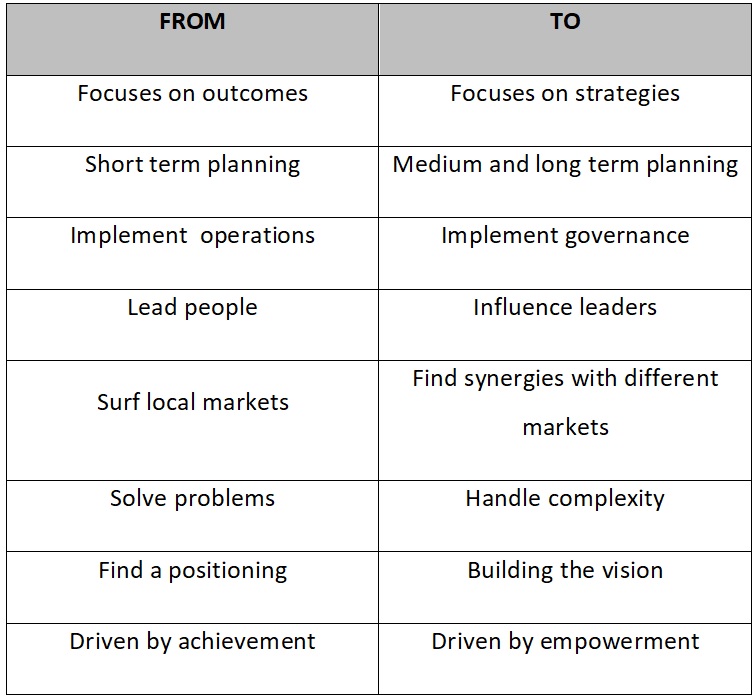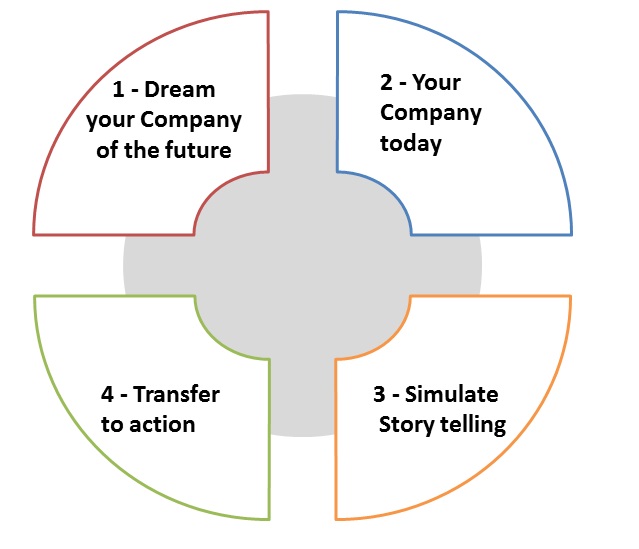A Coaching Model Created by Michele Longobardi
(Executive Coach, ITALY)
Assumption. While the literature on entrepreneurship is still discussing which variables or models may help to define entrepreneur’s features (1) and how these impact business, it is a common experience among consultants to see entrepreneurs who decide to scale up their business (i.e. growing from a small and self-organized model to a larger and structured one) to be faced with a change that requires a certain discontinuity regarding their managerial skills, and not only concerning their model of doing business.
This change can be seen from different perspectives and may include but be not limited to:
 In other words, an entrepreneur who decides to leave the “old small business model” is willing to move along a learning curve where they and the Organization are projected into a new journey that may modify missions, identities, and relationships.
In other words, an entrepreneur who decides to leave the “old small business model” is willing to move along a learning curve where they and the Organization are projected into a new journey that may modify missions, identities, and relationships.
We may imagine them initially being more motivated by personal drivers like achievement and quick-action than reflection and awareness. This could be reasonable if you are a small fish in a big ocean and have to fight with your cash flow to survive; but as soon as you move to a bigger complexity stage, a more “thankful and flexible approach” is requested.
How a coaching model that suits the case and helps the entrepreneur to grow together with the company be structured?
I imagined offering a 4-steps model where Awareness is the engine of the learning journey.

Step 1 – Dream your Company of the future
The goal is to explore as much as possible the client’s dreams about the scale-up, how their idea of entrepreneurship will look like in the future if they had the possibility to make it real without any constraints or obstacles. Consider what kind of results they want to achieve by this transformation and the meaning of it.
Coaching questions:
- What kind of entrepreneur do you want to become?
- What kind of company do you imagine for the future? What will it look like?
- What will the “scale-up” process bring to you?
- What will you achieve with this change?
- What will it mean for you once the transformation will be completed?
- How can you measure this transformation?
Step 2 Your Company today
At this stage, we encourage our coachees to explore the current situation and analyze what the resources available are and what can be spent immediately in the project. It may be too early to converge on a specific goal but this is a good opportunity to learn what the current business has in common with the “company of my dreams” and a spot to stimulate reflection about oneself.
Coaching questions:
- How is your Company today?/In which part of the transformation is it today?
- Where the current company looks like to the dream one?
- What do you already have?
- What is missing?
- What is your entrepreneurship style today?
Step 3 Simulate – Storytelling
From imagination to the invention. This stage is finalized to explore different possible paths – were “possible” here stresses the concept of “infinite possibility” of living dreams(3) – that can be taken by the entrepreneur to transform the company, inventing what is still not real and anticipating mentally what is needed. This step will apply simulational mind techniques(2).
Coaching questions:
- How will you feel when your dream will come true? What will you have achieved?
- What the company scrapbook will contain at the end of the journey?
- Which stories will you tell at the end of the journey?
- What paths will you have taken to bring your company to become the company of your dreams?
- How else can you make it happen?
- What inventions do you need to get there?
Step 4 Transfer to action
After the exploration of different possible paths, the coachee is invited to transfer the dreams and imagined paths to a concrete plan and set of actions. The aim of this stage is not only to take any action but to enrich it with awareness and connection moments. This step will apply the “helicopter view” technique, which is a zoom-in/out shift of attention from global to detailed actions, to train flexibility to shift(4). So, apart from the classical questions related to 9-10-11 ICF markers, a set of specific questions may be the following.
Coaching questions:
- Now you have imagined your paths to scale up, what will you do?
- How this specific action is related to the global picture/strategies?
- Where is the relationship between the short and long-term plans?
- What happens to your team as you make this change? How can you engage people in the project?
- What/where are the levers of influence in this plan/company?
- How is it changing in your way of doing business?
- Which stakeholder outside/inside the company can help you? Which synergies can you foster?
Once the 4th step has been completed, the entrepreneur may benefit from a follow-up session to decide to start a new cycle and a new challenge.
References:
Adesuwa Omorede & Sara Thorgren & Joakim Wincent (2015), Entrepreneurship psychology: a review, International Entrepreneurship and Management Journal volume 11, pages743–768
Keith D. Markman, William M. P. Klein, Julie A. Suhr (2008), Handbook of Imagination and Mental Simulation, New York, Psychology Press.
Mike Dooley (2009), Infinite Possibilities: The Art of Living Your Dreams
Atria Books / Beyond Words
Rosabeth Moss Kanter (2011), Managing Yourself: Zoom In, Zoom Out. https://hbr.org/2011/03/managing-yourself-zoom-in-zoom-out
